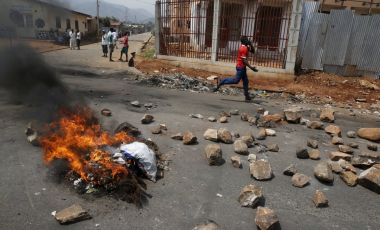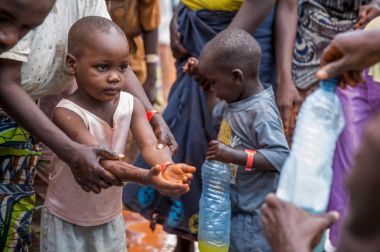Burundi: Hopelessness and fear as election tensions heat up

"Hopelessness and fear" are rife in Burundi, where voting is underway for the controversial presidential election.
Polls opened at 6am local time today, despite calls for the election to be postponed. President Pierre Nkurunziza is running for a third term, which opponents say is unconstitutional, and a policeman and civilian were killed in violent clashes overnight.
The opposition party has boycotted the vote, meaning that Nkurunziza is widely expected to retain his position. US State Department spokesman John Kirby said the election "will not be credible and will further discredit the government".
"The legitimacy of the electoral process in Burundi over the past few months has been tainted by the government's harassment of opposition and civil society members, closing down of media outlets and political space, and intimidation of voters," Kirby added.
"The government's insistence on going forward with Presidential elections on Tuesday risks its legitimacy in the eyes of its citizens and of the international community."
Simon Guillebaud, the founder of Great Lakes Outreach who has lived in Burundi for 16 years, says the crisis is worsening by the day. "International aid has dried up...and some of my friends in the capital are literally beginning to starve because food prices have trebled and many have lost their jobs as the economy implodes," he explained yesterday.
"It's hard to be positive as we look at the situation, humanly speaking. But God is still on his throne."
Speaking to Christian Today, Guillebaud said there is "a lot of hopelessness and fear" among Burundians, and "there is very little hope for a peaceful resolution to the conflict", whatever the outcome of today's vote.
"Both sides are equally entrenched as they ever were since fighting began, and no one is prepared to go for any rounds [of talks], so it's the hungriest nation in the world with the poorest economy, and it's only going to get poorer and hungrier," he said.
"Médecins Sans Frontières estimates that 1,000 people are fleeing a day, and so a lot of people are voting with their feet. There are people starving even in the capital, there is a lot of hopelessness and fear. We just have to wait and see."

World Vision has also warned that the refugee crisis in Burundi is deteriorating, and is likely to worsen following today's election.
UK Senior Conflict Advisor, Sarah Pickwick, recently visited the Nyarugusu refugee camp in Tanzania, where nearly 80,000 Burundians have fled. Some 60 per cent are believed to be children.
She described the situation as "dire", telling Christian Today that the conditions on the ground are "very, very stretched". With the camp now hosting more than twice the number of refugees than its intended capacity, and 300-500 new arrivals every day, people are forced to live in church buildings, schools and makeshift mass shelters.
Living areas are so cramped that some choose to sleep outside. There is also an immediate need for better health services and access to clean water. "There is a palpable frustration" among the refugees, Pickwick said, though she added that most are incredibly grateful for the help they are receiving.
She described meeting David, an 11-year-old Burundian who has fled his home country - one of around 169,000 people to have done so since political unrest began in Bujumbura in April this year. Because people are now camped in the camp's school buildings, he is unable to continue his education, and misses his home and friends.
The situation is unlikely to improve soon. "All the neighbouring countries [to Burundi] expect to see an increase in refugees," following today's election, Pickwick explained. She said it's difficult to speculate, but teams on the ground in Burundi itself have already begun preparing stockpiles of non-food items to support those still living in the country.











